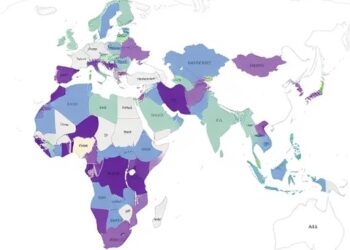A new study conducted by IIASA researchers and their colleagues highlights that cooperation in infrastructure operation between countries surrounding the Lancang-Mekong River Basin could bring major economic and environmental co-benefits.
A new study conducted by IIASA researchers and their colleagues highlights that cooperation in infrastructure operation between countries surrounding the Lancang-Mekong River Basin could bring major economic and environmental co-benefits.
The Lancang-Mekong River Basin is one of the largest rivers in the world, passing through Cambodia, China, Laos, Myanmar, Thailand, and Vietnam before emptying into the South China Sea. The national economies of those countries are in various ways reliant on the basin’s forest, agricultural, freshwater, coastal, and marine ecosystems, which provide crucial goods and services for the livelihoods of around 75 million people.
The basin is currently undergoing extensive water resource infrastructure development; however, it also faces severe climate change impacts, long-term transboundary conflicts, and trade-offs between economic goals and ecosystem services provision. To address these challenges and minimize the trade-offs, IIASA scientists Taher Kahil, Yoshihide Wada, and colleagues from other institutions conducted a new study, published in Nature Water, seeking to identify sustainable infrastructure operation pathways, which could also be replicated in similar contexts.
The study includes a new holistic modeling framework that simulates the multisectoral impacts of different policies and operational measures to evaluate the overall economic and environmental effects of various water resource development modes (e.g., non-cooperation, partial cooperation, and full cooperation). The framework integrates the physical infrastructure operation processes associated with water, energy, food, the environment, and their interconnectedness with the decision-making behaviors of national governments.
Applying the framework to the Lancang-Mekong River Basin allowed the researchers to draw several important conclusions. Most importantly, the findings of this study provide additional incentive for riparian countries (located on the banks of a natural watercourse) adjacent to transboundary river basins to choose full cooperation, as more incremental benefits from cooperation could be achieved by minimizing adverse environmental impacts from the existing and planned infrastructures, especially under changing climate conditions.
“We found that full cooperation in the operation of existing and proposed infrastructure outweighs non-cooperation or partial-cooperation modes by maximizing economic benefits while also minimizing the losses in fishery and sediment transport,” explains Taher Kahil, Research Group Leader and Senior Research Scholar in the Water Security Research Group of the IIASA Biodiversity and Natural Resources Program and a coauthor of the study. “Full cooperation becomes more beneficial and stable alongside infrastructure expansion, intensification of climate change, and the degree of satisfying hydrological needs for river ecosystems.”
Focusing primarily on riparian countries, the proposed modeling framework can also be applied in other parts of the world where countries share transboundary basins. The extracted data can be used to identify best practices and opportunities for sustainable development concerning water resources and infrastructure operation.
“Our study provides a good starting point for analyzing similar issues in other basins, but the design of full cooperation in a specific basin will require detailed assessments of local human needs, potential conflicts, and key valued ecosystem services,” notes Kahil. “Additional research is needed to deduce how local conditions and future climate will affect the nonlinear response of basin-wide benefits to the hydrological needs of valued ecosystem services, with the ultimate goal of achieving economic-environmental sustainability in complex and contested transboundary basins.”
Reference:
Yu, Y., Bo, Y., Castelletti, A., Dumas, P., Gao, J., Cai, X., Liu, J., Kahil, T., Wada, Y., Hu, S., Liu, B., Zhou, F., & Zhao, J. (2024). Transboundary cooperation in infrastructure operation generates economic and environmental co-benefits to the Lancang-Mekong River Basin. Nature DOI: 10.1038/s44221-024-00246-1
Journal
Nature Water
Method of Research
Computational simulation/modeling
Article Title
Transboundary cooperation in infrastructure operation generates economic and environmental co-benefits in the Lancang-Mekong River Basin




